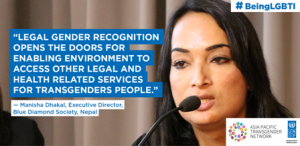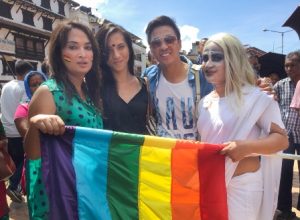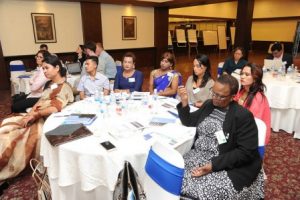Trans Community in South Asia Stands for Legal Gender Recognition: Manisha Dhakal

Over the last decade, the struggle for getting equal rights in South Asian nations on sexual orientation and gender identification has been at the forefront especially from the Lesbian, Gay, Bisexual, and Transgender (LGBT) community. It has been carried out by instituting various movements, groups and organisations which are at the grassroots for legalising their rights. Among South Asian nations, Nepal emerged as the global LGBT rights’ beacon because of the initiatives by various organisations and through judicial reforms for granting equal rights. One such organisation is Blue Diamond Society which aims at educating the community on sexual health, advocating and encouraging the rights of Lesbian, Gay, Bisexual, Transgender and Queer (LGBTQ) community and also contributes to provide care for victims of HIV/AIDS.
In an exclusive interview, Manisha Dhakal, an influencing voice in Nepal LGBTI struggles, is the founding member and the Executive Director of Blue Diamond Society, explains how LGBT activists in Nepal used a combination of tactics to overcome an archaic and patriarchal legal system and put the country at the forefront of LGBT rights worldwide.
Delhi Post: Tell us about your life?
Manisha Dhakal: I was a very feminine kind of boy. I used to play with girls in a school and was comfortable with them. My voice was soft and I found it easier to grow up with my sisters and mother. I remembered that I cried a lot during my first day of school. Teachers brought some game item. I chose a doll. I did not know why I chose the doll at that time instead of a car, ball or an aero plane, but now I can realise that feminine nature was always there from the beginning in my heart and soul. For that, I usually got teased by my friends.
Delhi Post: When did you realise that you identified with being a woman?
Manisha Dhakal: There was a gender topic in school. At that time, there was masculine gender, feminine gender and neutral gender (in Nepali, it is called Pulingi, Istri Lingi and Napunsak Lingi). When Napunsak Lingi was taught by the teacher, all students looked at me. At that time, I felt so stigmatised and humiliated. I realised that why I am different from others at that time. When I was in the adolescent age, I was attracted towards boys. At that time, I thought I am not a boy. But I could not share all these (feelings) to anyone because at that time there was no information available on social media or support organisation regarding this issue.

Delhi Post: How do you define Manisha Dhakal?
Manisha Dhakal: Manisha Dhakal is my choice to be an activist; she is a symbol of freedom for the LGBT community. She enlightens people to raise voice against the prejudice and for the equal treatment in the eyes of law.
Delhi Post: When you actually came out to your family, what happened?
Manisha Dhakal: I started to involve in Lesbian, Gay, Bisexual, Transgender, Intersex (LGBTI) movement in 2001. I joined Blue Diamond Society (BDS) in 2002. I was a cis- guy, when I started working with BDS and did not have the long hair and didn’t wear the female dress. I used to hide myself from my family; I didn’t tell them about my working at BDS and told to my family that I got small job in a health project. Slowly, BDS issues were covered in Media and my family came to know that I was in BDS. In 2006, my sister and father stopped me from going to office. They pressurised me to resign from the job. They did not allow me to go office for 3 days. Those 3 days were my turning point and opportunity to tell all about Sexual orientation and Gender identification (SOGI) and office work and my issue with my family. After long discussions, debates and cries, they finally realised that I am doing a good job towards the community and the society. Now, my family fully supports me.
Delhi Post: How pertinent was the disclosure for you, your family and at large the society?
Manisha Dhakal: I feel that family support is very important to move forward in your work. Support is very crucial in the process of activism. To become free and live life, by making choices at risk is a crucial part of everyone’s life where family acts as a support system. If we get the support from the family, then we can progress a lot in our personality, in our activism. If there is no support from the family, it’s very difficult to work and to involve in activism. As in my case, my family after understanding about sexual orientation and gender identity never pressurised me for marriage.
Also read: Missing ‘Rights’ in the Transgender Persons Bill
Delhi Post: Tell us about Blue Diamond Society? And your work as an Executive Director.
Manisha Dhakal: We started with only five volunteers and started to work on HIV and AIDS prevention program only in Kathmandu with feminine gay men and transgender people. During the past 18 years, we have expanded from HIV to Human Rights, Advocacy, Media, Capacity building, LGBTI, child rights, Family and students. We have expanded our geographical coverage from Kathmandu to more than 40 cities.
Delhi Post: Tell us about Nepal’s LGBTI rights movement? And your work as an activist.
Manisha Dhakal:From 2001 onwards, many accomplishments have been made for the equality of LGBTI rights and social justice. Supreme Court of Nepal ordered Nepal government to provide equal rights for LGBTI people in 2007. After those court orders, Government of Nepal formed same sex marriage committee and made them to study same sex relationship in other countries for comparative analysis. The report submitted by the committee was in favour of LGBTI marriage equality. After the court decision, gender minorities’ are now getting citizenship in “Other” category since 2013. After that, this provision has been reflected in the passport since 2015.
Again Supreme Court gave its encouraging verdict in 2013 that two adults can stay together regardless of sexual orientation and gender identity. Again in 2017, SC ordered to give non-tourist visa for another citizen (LGBTI) who married a Nepalese (LGBTI). SC again ordered Nepalese government to make provision to amend name in citizenship card and other academic documents for gender minorities people.
As a result of the long struggle of LGBTI community in Nepal, the Constitution of Nepal 2015 endorsed momentous decisions in favor of the LGBTI community by giving them constitutional safeguards. The Article 18 of the constitution states ‘Right to equality’ manifests the idea that the state and judiciary are not allowed to discriminate against minorities and Article 12 ensured the LGBTI community’s right to choose their gender identity. Despite ensuring rights in the Constitution, there are numerous challenges still remaining in context of ensuring equal human rights, implementing law and legal recognition, increasing social acceptance, and addressing non-discriminatory behaviour towards LGBTI in public sectors particularly from the healthcare setting.
Thus, LGBTI movement to achieve equal rights is still on-going. In September 2015, Nepal promulgated a groundbreaking new constitution which protects the rights of gender and sexual minorities, making it the only country in Asia to institute such far-reaching protections.
Delhi Post: What kind of image appears in your mind when it comes to a transgender?
Manisha Dhakal: I want transgender as doctor, business woman, banker, model, politician, lecturer etc.
Delhi Post: Legal Gender Recognition (LGR) is seen as a legal way to recognise gender identity. Your thoughts on the same?
Manisha Dhakal: Government officials, transgender groups, national human rights institutes, civil society and development partners gathered for a regional roundtable discussion from 27-28 September at Kathmandu for a discussion about development in the areas of safeguard laws, programmes and policies on LGR for South Asian nations. There should be option for the transgender people to choose their gender male, female or Transgender. LGR is a person’s gender identification together with sexual orientation. It also focuses on registration of names in public registries and documents. It also helps to provide LGR based on human rights which respects self determination.
There has been the notable progress in South Asia concerning LGR. Supreme Courts’ judgments and cabinet decisions have recognised a third gender on their respective documents. Pakistan recently passed the “Transgender Person (Protection of Rights) Act, 2018’. In India, Bill is pending before the parliament to become an act in that regards. Additionally, in Nepal, the 2015 Constitution includes protections for sexual minorities, including third gender recognition.
Delhi Post: How did Nepal Become a Global LGBT Rights Beacon?
Manisha Dhakal: Nepal was never ruled by any colonial master and also we do not have any criminalisation law against homosexuality like 377 in India. Also in Nepal, there were no customs or practices for LGBTI people. And LGBTI movement goes together and we never separated our issue within us. We came out to media to break the silence and regular advocacy efforts go beyond the project.

Delhi Post: Tell us about your experience at Supreme Court of Nepal in 2007, while fighting for transgender rights?
Manisha Dhakal: The picturesque of being at the Supreme Court of Nepal in 2007 is still not faded. During the hearing of the case, when asked by the Justice – “Are there any LGBTI community members who can share their personal experiences?” My heart raced, I immediately raised my hand without hesitation and shared my personal story of being stigmatised and discriminated every day merely for being a transgender woman. How men grope me on public transport, how thugs on the street whistle at me, how government officials shamelessly ask personal questions about my genitals and much more. I have endured countless humiliations but have come out stronger every time, ready to fight against the conservative forces of patriarchy and heteronormativity and fight for the dignity and safety of my community. I outlined other issues facing LGBTI Nepalese such as lack of relationship recognition, lack of employment prospects, social derision, lack of protective laws, harassment from police and rampant bullying in schools. While I did not realise it at the time, my story apparently made a huge impact on the justice and contributed to a momentous verdict in favor of LGBTI rights and protections on December 21, 2007.
Also read: Love in the Time of Section 377
Delhi Post: Do you think education helped you make a mark? As an educated transwoman, how important do you think education is for the transgender?
Manisha Dhakal: Education is important together with experience. I think education with lots of experience help us to raise our issue properly. In this competitive time, if we want to broaden our skill and area of work, definitely education is very much important.
Delhi post: What could be the future course of action that you as an activist would like to mention for more inclusion in India?
Manisha Dhakal: We activist in the region need to come together to raise our joint voice and support each other at regional level. Regional level advocacy and visibility is necessary.
Delhi Post: With decriminalisation of Section 377 in India, protections for sexual minorities in Nepal, Pakistan’s Right Bill for Transgender, do you think Governments and nations, particularly the South Asian nations are waking up to the third gender?
Manisha Dhakal: It seems so. But only providing legal document is not enough. We need equal opportunity in education, employment and political inclusion. South Asian governments, courts are waking up on LGBTI issue but these court decisions are first step. We want proper implementation of these decisions in practice through positive laws and policies. For these it’s our responsibilities to advocate consistently until and unless we achieve equality.
Delhi Post: Top three moments in your journey that you look back now and are extremely proud of?
Manisha Dhakal: Family acceptance changed my life; my role for Supreme Court judgment in 2007 and Nepali Constitution promulgated LGBTI rights.
Delhi Post: Your message for the third gender and the society, Nepal and the globe?
Manisha Dhakal: If we want to change the society, first we have to be proud about ourselves. We have to come together and show unity and should come up with joint common voices. We should not limit our issue within ourselves. We have to build our alliance to find support from others and to support other issues as well.
